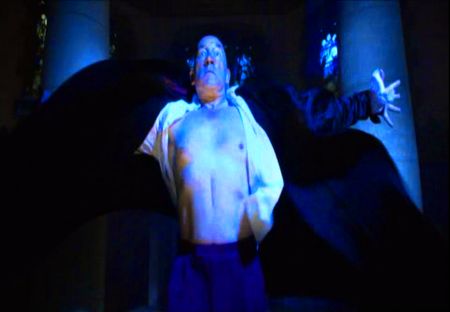El Niño de la Luna
DIRECTED BY: Agustí Villaronga
FEATURING: Enrique Saldaña, Maribel Martin, Lisa Gerrard, David Sust
PLOT: A young orphan is brought to a special institute where the proprietors are attempting to create the conditions for the birth of a spawn of the dark underworld.

WHY IT WON’T MAKE THE LIST: Inspired by a novel by legendary occultist Aleister Crowley, Moon Child excels at mood, finding an intriguingly off-kilter vibe and riding it from beginning to end. But while the film offers situations and set pieces that may raise an eyebrow, the fantastical premises are addressed in a logical, rational fashion that keeps things too reasonable to be among the truly weird.
COMMENTS: A friend of mine once picked up a side job writing T-shirt slogans. At the height of the world’s obsession with Harry Potter, he made a tidy sum with the pithy observation, “Not all orphans are wizards.” Moon Child suggests an intriguing alternative: some orphans are the supernatural impetus for the birth of a world-destroying offspring of Satan.
This isn’t left up to interpretation. Young David (Saldaña) has been having strange and powerful dreams when a mysterious woman comes to test him. She represents an occult institution trying to engineer the perfect conditions and genetic bloodlines to trigger the birth of the spawn of the lord of the underworld. That goal dovetails nicely with the aims of the orphaned David, who has been trying to understand his place in the world. Perhaps the birth of a Moon Child is a win-win.
There’s an oddness and even a little humor in the cult’s methodical efforts to summon the devil. While supernatural powers are abundant at the resort-like outpost, the search for the right genetic donors is far less promising. The simple Georgina and the vision-challenged Edgar are finally selected. This culminates in the film’s unquestionable centerpiece, in which the couple consummates their expected Moon Child parentage on an altar beneath the bright rays of the moon. It’s part of Moon Child’s awkward charm that David is witness to this whole inappropriate display, but is interested exclusively in the implications for his own situation, oblivious to the very adult activities transpiring.
Much of the film hinges on the performance of two novice actors, who acquit themselves decently. Child actor Saldaña approaches everything with a wide-eyed, slack-jawed gape, but fortunately for him, the proceedings are sufficiently shocking to justify his one emotional register. For her part, Gerrard (half of the dream-pop duo Dead Can Dance, who also provide the atmospheric score) holds her own in a part that demands much of a first-time performer, including vomiting, a sandstorm, some slapstick during a lecture, and a very exposed sex scene. They do fine, and but are also aided by the film itself, with maintains an intriguing yet unsettling air that serves them well.
In fact, most of what Moon Child is, in the end, is atmosphere. As the setting moves to more exotic locales and as David gains more understanding and encounters new obstacles, the unifying force for the film remains a general feeling of unease. That pays off in a finale that is at once unexpected while fitting perfectly with the overall sense of dread. Not all orphans are wizards, it’s true. Some of them are so much more.
WHAT THE CRITICS SAY:




